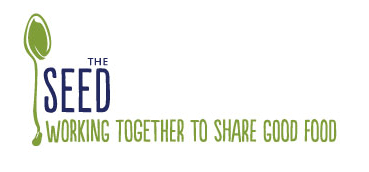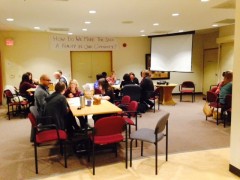by Lily Haines, CFICE KMb RA
Food Security means all people, at all times, have access to safe, sufficient and nutritious food. But for eight per cent of Canadians, food security does not exist. That’s 1.1 million households, according to Statistics Canada’s most recent 2011-2012 report. So how can communities do better?
The statistics are devastating, but Erin Nelson and her colleagues harnessed these ugly figures as motivation. Through community research and consultation, Nelson, a current postdoctoral fellow at Wilfred Laurier University, and her team founded a local community food centre called The Seed.
Based out of Guelph, The Seed aims to eliminate poverty and food insecurity. It also channels a unique and alternative method of food delivery. The organization shifts away from the old-fashioned, ‘food bank charity case,’ to a newer model that focuses on social justice and equity. “The community food centre model,” Nelson said, “is for everyone.”
On the other hand, the traditional food bank model breeds stigma and judgement, Nelson said, so accessing food services can sometimes be humiliating and degrading for people. “Community food centres focus on people not feeling that way,” she said.
“The Seed creates a space for people where they’re going to feel empowered, they’ll feel a real sense of community building, and come together around food in a positive way,” said Nelson.
Over the next three years, The Seed aims to become a food hub, rather than a food bank. The centre will, for example, encompass a community kitchen, a local garden, and nutrition and healthy eating workshops open to all. It will also distribute healthy and fresh food to local emergency food providers and their clients.
The Seed’s founders asked locals who have experienced poverty and used emergency food services in the past to play an integral role in the planning process. “We wanted people who were using the service to be involved in decisions about how the [new] service would be created,” Nelson said.
The planning and development of The Seed was largely a community-driven, consultative process, Nelson said. “We used it as a big tent for people to get involved,” she said. “We hosted lots of community events and we gained partners in the university, social service agencies and businesses… we tried to make it a positive experience all around.”
The Trillium Foundation provided a prestigious $267,000 grant to develop The Seed. Various fundraising events and sponsors, including CFICE, also helped establish the organization and increase awareness about the emerging community food centre model.
As for Nelson herself, she no longer works on The Seed’s steering committee, but hopes the centre will have a bright and exciting future. “I’m teaching at the University of Guelph now, but still very much working at the intersection between university research and community organizations in the area of sustainable food systems…I’d definitely be happy to volunteer with The Seed down the road.”

